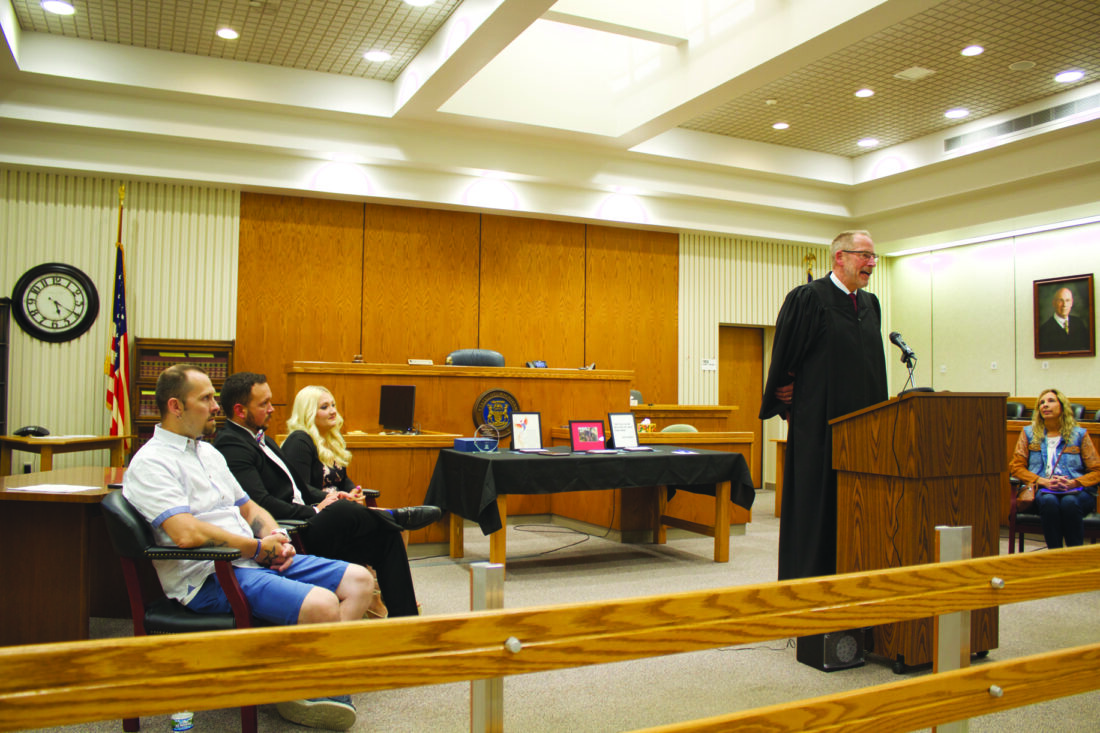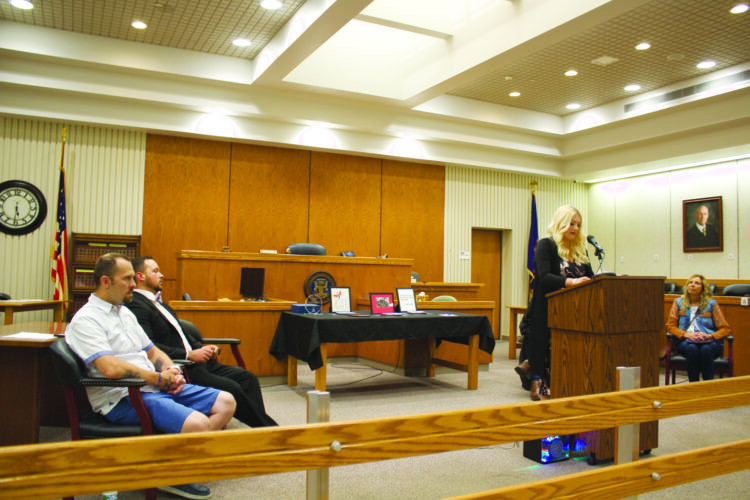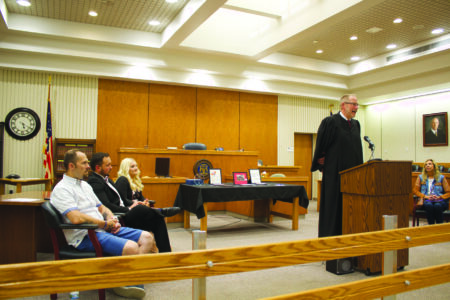Drug court graduates testify how sobriety program changed their lives

Noah Johnson Daily Press 94th District Court Judge Steven C. Parks speaks to the crown at the 15th Delta County Drug/Sobriety Court graduation. Three more individuals graduated Monday night, brining the total number of graduates to 51.
ESCANABA – The Delta County Circuit Court was packed on Monday night, but not for any ordinary court proceedings.
Instead, three individuals were celebrated as they graduated from the Delta County Drug/Sobriety Court.
“This is kind of an exciting night for those of us that are part of the drug court team because this is our 15th graduation,” said 94th District Court Judge Steven C. Parks.
“What makes this night particularly important is that we’ve crossed the threshold. With these three, we’ll be up to 51 graduates from the program.”
Graduating were Mike Bizeau, Jorge Gonzalez and Felicity Stevenson.
The evening began with Parks’ opening remarks, followed by brief introductions of each graduate.
Parks took time to recognize not only the graduates but also everyone on the drug court team who makes what they do possible.
“I always like to take a look and acknowledge all the people that got us here today. The drug court program is based on a team approach, and so I’m one of many parts of that team,” Parks said.
Parks also recognized the rest of his team in district court, who keep things moving while he is in drug court, as well as 47th Circuit Court Judge John Economopoulos for allowing drug court to use his courtroom for the past 15 graduations.
Parks first introduced Bizeau, who previously graduated from the program in 2021, but would later relapse.
“He said his plan was this time he wants to crush the program, and indeed he has,” Parks said.
“He’s been clean for 502 days, and that’s with all kinds of testing, and he’s turned it around.”
Parks said Bizeau was allowed back into the program because he is a kind-hearted person who the team felt deserved another chance.
Bizeau told Parks that he is more plugged into the recovery community and is starting courses to become a peer recovery coach.
Each graduate was given an opportunity to share their testimony, starting with Bizeau.
He said he started experimenting with marijuana and alcohol in high school, having no idea that it would become a serious problem.
His use of marijuana and alcohol became a daily occurrence, and he began experimenting with prescription pills.
His addiction continued and progressed to the use of methamphetamines.
He then had his first stint in drug court after his arrest, but it didn’t take long before he succumbed to his addiction.
He was picked up again for having unprescribed pills in his possession. Former magistrate and drug case manager Jeanna LaCarte reached out to Bizeau and told him to write her if he wanted another chance in drug court.
“I did, and I got accepted. This time around, I got way more involved, from meetings to participating in recovery-related events, service work, and even becoming a peer recovery coach. I am so grateful that I was given the opportunity to participate in drug court again.
It has put me back on the right path and brought me so many wonderful people back in my life,” Bizeau said.
Second to be introduced was Gonzalez, a graduate of the Southern University Law School in Baton Rouge, La. Gonzalez struggled with addiction and attended inpatient rehab for alcohol.
A colleague in the area suggested that he move to Delta County and offered him a business opportunity.
“Of course, you can’t address a problem necessarily with the change of scenery,” Parks said.
Gonzalez was lonely and depressed when he arrived, and he began drinking again.
He was arrested at the beginning of 2024 for drunk driving, his second offense.
When Parks met Gonzalez, it was apparent he was struggling, but he has since flipped the script and fought back against his addiction.
“Since he’s been with us, we’ve seen some real positive changes,” Parks said.
“Jorge (Gonzalez) has been a stellar employee in the program, done everything that we asked him to do.”
Before sharing his testimony, Gonzalez recognized Parks for his help and kindness to him.
“I do want to preface that he is an amazing man. I’ve been all over the world and met a lot of people, they don’t make them like him,” he said.
Gonzalez provided his testimony through a self-written poem entitled “The Ride”, which encourages himself and others to not live in the past, but to live in the moment until there is no moment left to experience.
“Living in the past instills depression, living in the future invokes anxiety, living in the present is peace. I love who I am today. That change started here,” Gonzalez said.
He added that the changes made could not have been accomplished alone, saying he only realized he needed to change because it was forced on him.
“The realization was forced upon me because it had to be,” he said.
“I don’t believe that I would have arrived at this realization on my own, and I certainly wouldn’t have walked this path without my amazing support system, the staff present in this building with their ever-present assistance and understanding.”
Finally, Parks introduced Stevenson, who grew up with parents with substance abuse issues and was unable to care for her. She moved in with her grandparents when she was a child.
Stevenson began dabbling with marijuana, alcohol, and cigarettes at just 13 years old, before moving to harder substances at 16, such as methamphetamine and heroin.
Shortly after that, she became an IV user. Stevenson became a mother at 17, but she did not use any substances while she was pregnant.
“She says that at the height of her addiction, she was between the ages of 18 and 22. She came to us on the charge of possession of methamphetamine, which is a 10-year felony, and she is now logged in 272 days of sobriety,” Parks said.
He added that Stevenson is currently employed and working towards her GED.
Stevenson shared her testimony, saying there were points in her life when she didn’t want to live anymore.
“I was always under the influence, stealing, getting high, doing things I would never do if I was sober. There were many times, many years, I didn’t even want to live anymore. I was in and out of jail year after year,” Stevenson said.
Amid her addiction, Stevenson’s mother got sober and became one of her biggest supporters.
She also spoke about her grandmother, who cared for her child while she was in the middle of her addiction.
“When I finally got the help I needed. She gave me a place to stay, a space to begin healing, and the time and support I needed to rebuild my relationship with my daughter,” she said.
Stevenson also shared a message of hope for those battling addiction, saying there is always hope.
“No matter how far gone you feel, you are not beyond hope. You can change, you are not hopeless, you are not beyond saving. If I can do it, you can too. Never stop believing in the possibility of a new beginning,” Stevenson said.
Each graduate received applause after they shared their testimonies.
Before receiving their graduation plaques, the graduates heard from guest speaker Emma Marchese.
Marchese shared her own story, full of heartbreak, tragedy, and addiction.
She grew up with an abusive and alcoholic father, who abused her mother. When Marchese was 12, her brother was killed in a motorcycle accident, sending her mom down a path of alcoholism as well.
Marchese didn’t want to drink like her parents, so she leaned on her peers for support.
She and her husband developed alcoholism, and had many instances of blacking out, but it didn’t make them want to stop.
“I was terrified, but that didn’t make me stop drinking. I just drank again,” she shared.
She continued to struggle and dealt with the tragedy of losing their teenage son to suicide, just a month after their other son was diagnosed with leukemia.
She said she felt numb and didn’t want to live anymore, but later realized on a boat ride that she wanted to live and be there for her kids.
“The weather got bad. We thought we were going to capsize. And at that moment, I realized that I wanted to live because I had children at home that they need their parents. And all of a sudden it cleared up as if it didn’t storm, and we went home in silence,” Marchese said.
She shared that her mother was able to get sober, her son, who was diagnosed with leukemia, is now 40 and happily married with children, and she and her husband, Mark, are sober and on their recovery journey.
Marchese ended by reading a quote from Anthony Gucciardi, saying, “The butterfly does not look back at the caterpillar in shame. Just as you should not look back at your past in shame. Your past was part of your transformation.”
Each graduate received their plaque, officially becoming a drug court graduate.
“Once in drug court, always in drug court. What that means is that we’re always here for you, for better or for worse. We want to share in your happiness, and we like to hear from you when things are going well, but if you’re struggling, if you have needs, we’re here. Your success is our success,” Parks said.

